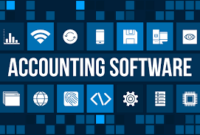The Best Accounting Software for Medium-Sized Businesses: Simplify Your Finances
Introduction
Running a medium-sized business comes with its own set of challenges, and managing your finances is undoubtedly one of them. The right accounting software can be a game-changer, helping you streamline your financial processes and gain valuable insights into your business’s financial health. In this blog post, we’ll explore the best accounting software options available for medium-sized businesses, their benefits, pricing, and how to choose the perfect fit for your needs.
Brief Overview of the Best Accounting Software for Medium-Sized Businesses
When it comes to accounting software for medium-sized businesses, there are several top contenders that offer powerful features and user-friendly interfaces. Let’s take a quick look at some of the best options available:
1. QuickBooks Online: Known for its robust functionality and scalability, QuickBooks Online is a popular choice among medium-sized businesses. It offers features like invoicing, expense tracking, inventory management, and financial reporting.
2. Xero: Xero is another cloud-based accounting software that caters to the needs of medium-sized businesses. It provides comprehensive features such as bank reconciliation, project tracking, and integration with various third-party apps.
3. Zoho Books: Zoho Books is a budget-friendly accounting software option that doesn’t compromise on functionality. It offers features like invoicing, expense management, and bank feeds, making it a suitable choice for medium-sized businesses looking for affordability and efficiency.
How Accounting Software Can Help You
Implementing the right accounting software for your medium-sized business can bring numerous benefits to your financial management processes. Here are some key advantages:
1. Time-saving: Automating tasks such as invoicing, expense tracking, and report generation saves you valuable time, allowing you to focus on core business activities.
2. Improved accuracy: Manual bookkeeping is prone to human errors, but accounting software reduces the chances of mistakes, ensuring accurate financial records.
3. Streamlined processes: Accounting software streamlines your financial processes by integrating various functions, such as invoicing, inventory management, and payroll, in a single platform.
4. Real-time insights: With up-to-date financial data at your fingertips, you can make informed decisions and gain a clear understanding of your business’s financial health.
How to Choose the Best Accounting Software for Your Medium-Sized Business
Choosing the best accounting software for your medium-sized business requires careful consideration. Here’s a step-by-step tutorial to help you make an informed decision:
1. Assess your needs: Identify the specific accounting features and functionalities that your business requires, such as invoicing, expense tracking, payroll management, or inventory control.
2. Scalability: Consider the growth potential of your business and choose software that can accommodate your expanding needs.
3. Integration capabilities: Ensure that the accounting software you choose can integrate with other tools or software your business relies on, such as CRM systems or e-commerce platforms.
4. User-friendliness: Look for software with an intuitive interface and easy navigation, as it will reduce the learning curve for your team.
How Much Does Accounting Software Charge?
The pricing structure of accounting software varies depending on factors such as the features included, the number of users, and the level of support provided. Most accounting software offers subscription-based plans, with prices typically ranging from $20 to $150 per month. Some software providers also offer custom pricing for businesses with specific needs.
Comparison of the Best Accounting Software for Medium-Sized Businesses
Let’s compare the top three accounting software options for medium-sized businesses in terms of their key features:
< th>Feature
| QuickBooks Online | Xero | Zoho Books | |
|---|---|---|---|
| Invoicing | ✓ | ✓ | ✓ |
| Expense Tracking | ✓ | ✓ | ✓ |
| Bank Reconciliation | ✓ | ✓ | ✓ |
| Inventory Management | ✓ | ✓ | ✓ |
| Integration | Extensive | Extensive | Limited |
Benefits of Accounting Software for Medium-Sized Businesses
Implementing the best accounting software can offer several advantages for medium-sized businesses:
1. Enhanced Efficiency
Accounting software automates manual tasks, reduces paperwork, and enables faster and more accurate financial processes, resulting in improved overall efficiency.
2. Better Decision Making
Access to real-time financial data and insightful reports empowers business owners to make data-driven decisions, leading to better business outcomes.
3. Regulatory Compliance
Accounting software often includes features to help you stay compliant with tax regulations and industry standards, reducing the risk of errors or penalties.
4. Improved Cash Flow Management
By tracking income and expenses, generating invoices promptly, and monitoring receivables, accounting software assists in optimizing cash flow management.
Conclusion
Finding the right accounting software for your medium-sized business is essential for efficient financial management. Whether you opt for QuickBooks Online, Xero, or Zoho Books, implementing a robust accounting solution will streamline your processes, provide valuable insights, and help you make informed decisions. Assess your business’s needs, compare features and pricing, and choose the software that aligns best with your requirements. With the right accounting software in place, you can simplify your finances and focus on growing your business.



